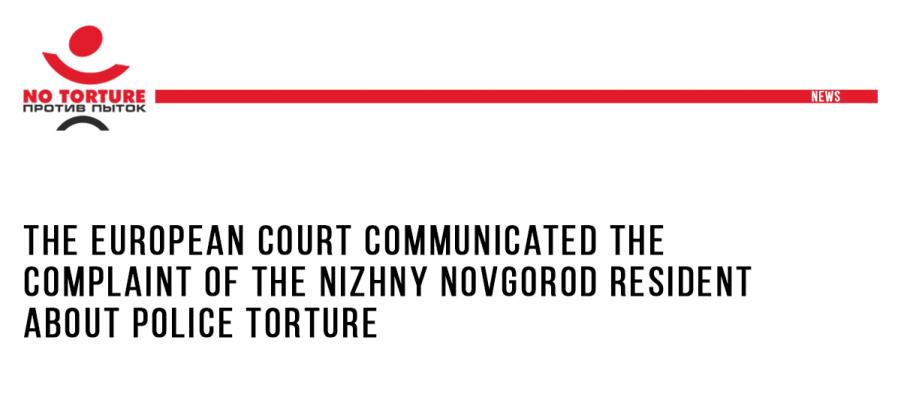
The European Court of Human Rights posed questions to the Russian authorities on whether Leonid Mursky from Nizhny Novgorod was subjected to police torture four years ago and whether the effective investigation of his complaint was conducted. The criminal case on Mursky tortures was initiated at the national level only after five illegal refusals to open a criminal case were issued and a complaint was lodged with the ECHR.
On 19 March 2015, Leonid Mursky from Nizhny Novgorod applied to the Committee Against Torture for legal assistance. He told human rights defenders that in the evening of 17 March he was apprehended near the door of his house and taken to police department No.7, where the police officers started to extort from him the confession of sale of drugs.
“In the room I sat on a chair, immediately after that I received a blow in the face from a police officer. He added: “Such scum as you should sit on the floor, you haven’t earned the right to sit on a chair yet”, – Leonid recalls.
According to Mursky, several police officers were involved in his battery – they beat him with feet and hands, threatened him to take to the Grebnoy channel and drown him there.
“I was already all in blood, and I perceived these threats to take me to the rowing canal as a direct threat to my life, that is why I wrote a full confession as dictated by a police officer. They also forced me to write the details of narcotic substances manufacturing process”, – Mursky described.
Subsequently, Leonid was convicted to four and a half years under part 3 of Article 30, item “g” of part 4 of Article 228.1 of the Criminal Code of the Russian Federation (“Illegal manufacture and sales of psychotropic substances performed by a group of persons by previous concert, on a large scale, on condition that the crime was not completed due to circumstances which do not depend on this person”).
Leonid was released from police with travel restrictions, and on the same day he applied to the first aid station, where he was registered with: “Bruises and scratches of the forehead, suspected non-displaced fracture of 6th-7th odontoid vertebras”.
Later on, the following conclusions were made based on the results of medical forensic expert examination: “L.G.Mursky had a closed craniocerebral injury: brain concussion, extravasations and scratches on the face, forehead, hemorrhaging in the soft tissues (hematoma) of the occipital region. The injuries included in the complex of a craniocerebral injury, are characteristic of a blunt trauma, i.e., they were generated with a blunt object, by the way of impact, compression, friction. This injury should be treated as the one which inflicted mild health damage. The possibility of the generation of injuries on L.G.Mursky within the timeline and under the circumstances described by him in the explanation dated 23.06.2015, is not excluded”.
Lawyers with the Committee Against Torture applied on behalf with Leonid Mursly with a crime report to the Investigative Committee as well as to the Department of Internal Security of the Ministry of the Interior.
During the pre-investigative check the investigators issued six refusals to initiate criminal proceedings with regard to the Mursky’s torture complaint. Human rights defenders successively appealed against these rulings, however, the last refusal was declared legal by the courts of two instances.
With regard to this, on 5 April 2019, lawyers with the Committee Against Torture submitted an application to the European Court of Human Rights on behalf of Leonid Mursky. According to human rights defenders, the articles of the European Convention, prohibiting tortures and guaranteeing effective investigation, were violated with regard to him.
On 22 May of this year, the criminal case with regard to unidentified police officers’ committing a crime against Leonid Mursky under item ‘a’ of part 3 of Article 286 of the Criminal Code of the Russian Federation, was opened, in the end (“abuse of office using violence”).
Today, the lawyers with the Committee Against Torture received a notification from the ECHR, stating that the complaint in the interests of Mursky was communicated: the Strasbourg judges posed questions to the Russian authorities on whether he was subjected to police torture and whether his complaint was effectively investigated at the national level.
“In this case we successfully insisted on initiating criminal proceedings with regard to torture, which is not frequent in our practice. However, this does not mean that the unsatisfactory investigation which lasted previous four years, will now be improved and will lead to punishment of those who are responsible for tortures, – lawyer on international law with the Committee Against Torture Ekaterina Vanslova comments. – Many activities are no longer possible to be effectively performed after so much time passed. For example, the witnesses which were not timely questioned, will now hardly remember the details of what happened. At the same time, it is not guaranteed that the case will be promptly sent to court and the guilty party will receive just punishment. In any case, at the present time the investigation is not completed, the guilty party is not identified, the moral damage inflicted to Mursky is not compensated – which means that Russia will either have to agree with a violation or to restore the applicant’s rights “forcefully” – already after the ECHR issues the ruling”.